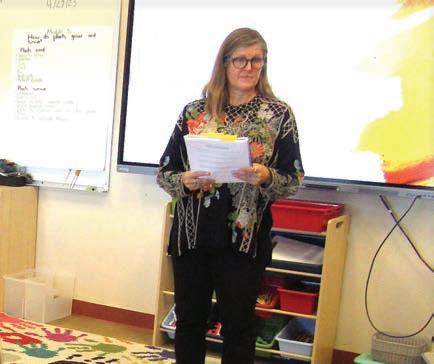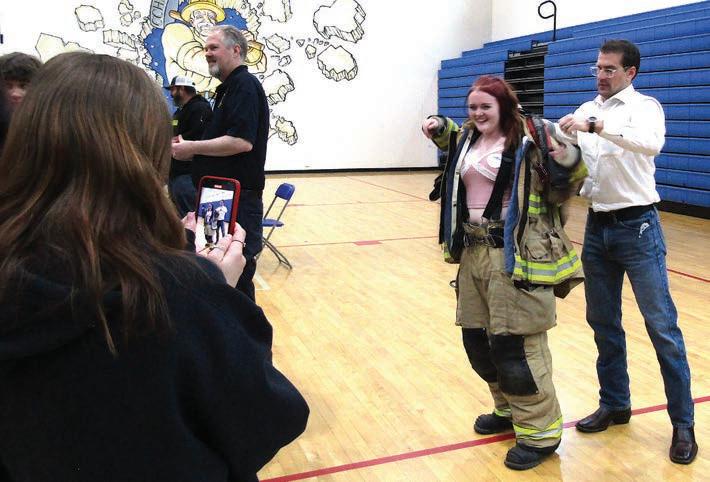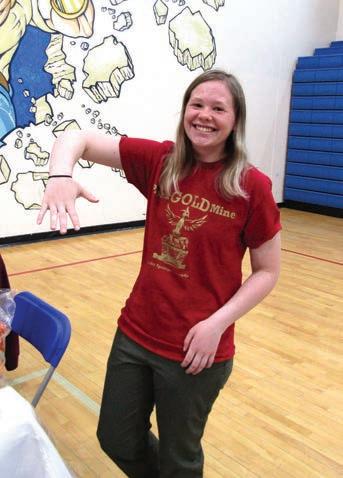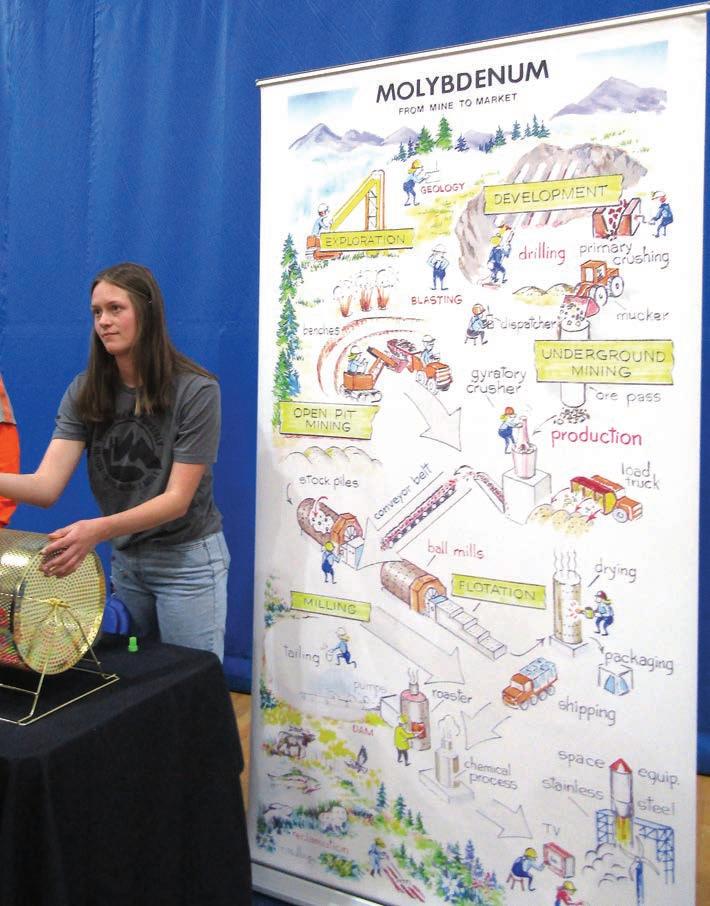
4 minute read
Walking in someone else’s shoes: Evergreen school hosts seminar on what it’s like to be dyslexic

Ihave always been an avid reader. My childhood is lled with memories of my nose in a book – historical and science ction mostly, though I have broadened my reading horizons as I have gotten older.
When I got married more than three decades ago, my husband told me he was dyslexic, never reading novels because he can’t read fast enough to follow the plot. However, he’s a retired environmental engineer who is close to a doctorate in soil physics, so he is constantly reading professional journal articles. He never complains about his dyslexia.
I never really thought about whether he struggled with reading because he’s always reading.
en my youngest daughter was diagnosed with dyslexia after second grade. She was in special programs in elementary and middle school to help with reading comprehension, and she never complained. She now has associate’s, bachelor’s and master’s degrees.
I never really thought about how much she struggled with reading.
Enter the private school Vertical Skills Academy in Bergen Park. e school, which opened in 2014 — the year my daughter graduated from Evergreen High School — specializes in working with children with dyslexia. Twice a year, the school hosts an open house along with a two-hour seminar on what it’s like to be dyslexic. I decided to go, and I am now much more aware of the challenges my husband and daughter and millions of others have faced all their lives.
Dyslexia is more common that we might think. Depending on which organization you ask, between one in 10 and one in ve people in the world is on the dyslexia spectrum from very mild issues to having more profound reading di culties.
ose who went through the training with me — parents, members of the school’s board of directors and other interested folks — called the training eye-opening, one that helps
HURLEY BROBST
Contact Us: 1630 Miner St., Idaho Springs, CO 80452 - 303-566-4100
Mailing Address: 750 W. Hampden Ave., Suite 225
Englewood, CO 80110
Phone: 303-566-4100
Web: ClearCreekCourant.com
To subscribe call 303-566-4100 them be more empathetic to the challenges those with dyslexia face every day.
According to the International Dyslexia Association, dyslexia is a learning disability that is neurobiological in origin. It’s not an eye problem. Simply put, it’s when people may not see the correct letters or words, which makes it super di cult to read and understand what they have read. It is not just seeing words backward, which seems to be the perception by some.
When our schools expect students to read to learn — and when it’s nearly impossible to comprehend — our children who are dyslexic are set up for failure.
You can talk about dyslexia all you want, but seeing is believing.
To explain what it’s like to be dyslexic, Christine Riedlin, a Vertical Skills Academy teacher, put the group through ve simulations.
We were tasked to read a paragraph to ourselves where the i’s could be i’s or e’s and the p’s could be p’s or t’s. en we read a paragraph out loud to the rest of the group with the same rules. Figuring out a single word was a victory.
So “spriss” was actually “stress.” We all felt that stress. is was HARD!
Riedlin asked us to write sentences with our non-dominant hand, a task
LINDA SHAPLEY Publisher lshapley@coloradocommunitymedia.com
MICHAEL DE YOANNA Editor-in-Chief michael@coloradocommunitymedia.com
LINDSAY NICOLETTI Operations/ Circulation Manager lnicoletti@coloradocommunitymedia.com that takes so much extra thought. en I performed a demonstration: Walk three steps toe to heel, stop and pat your head, then do it again. When I nally walked to the teacher, I was supposed to talk about what I cooked for dinner the night before. Who has time to think about what I cooked for dinner when I’m trying to walk and pat my head?
Riedlin used the demonstration to show how people with dyslexia spell and write.
A student who wants to write about how the Grand Canyon is a magni cent place will change it to the Grand Canyon is big just because it’s easier to spell and write.
“If you have to think about how words are formed,” she explained, “it has an impact on how you write a sentence, so their sentences look more elementary. ey work so hard on the mechanics such as spelling that they don’t think much about the content.”
All of this is multitasking on steroids, so exhausting, and something people with dyslexia can face daily
RUTH DANIELS Advertising & Sales rdaniels@coloradocommunitymedia.com
KRISTEN FIORE West Metro Editor kfiore@coloradocommunitymedia.com as they try to gure out words and comprehend them.
For children with dyslexia in a classroom full of students who don’t have those issues, they feel inadequate because they can’t read or comprehend the written word like the others. Dyslexia has nothing to do with intelligence.
Riedlin advocated for teachers getting more training about dyslexia and remediations, especially when so many children are dyslexic — something that isn’t happening enough.
I left the seminar with profound empathy, not just for my husband and daughter, but for everyone who doesn’t learn using traditional methods. is seminar gave me the opportunity to walk in other people’s shoes — those of my husband and daughter — and I am grateful. While I can’t cure their dyslexia, at least I can understand it better.
Deb Hurley Brobst is a Community Editor at the Canyon Courier. She can be reached at dbrobst@coloradocommunitymedia.com.
Columnists & Guest Commentaries
Columnist opinions are not necessarily those of the Courant.
We welcome letters to the editor. Please Include your full name, address and the best number to reach you by telephone.
Email letters to kfiore@coloradocommunitymedia.com circulation CO to: the time and volunteering where he is actively helping someone in the community.
Deadline Wed. for the following week’s paper.











“I couldn’t recommend it more,” he told Lesser. “We get to help the community.” e Phoenix Gold Mine in Idaho Springs is looking to hire cashiers, gold-panning instructors and tour guides, and Janice Kaup, the marketing and operations manager, said that they’re mainly outside jobs. She said jobs were available for high school students not only in the summer but throughout the year. “It’s not a common job,” Kaup noted, “but we want Clear Creek teens to know that there are jobs available.” e Clear Creek Rock House is looking for teens to help out on its Summer Fun Wednesday Nights, where youth can play games, sing karaoke, have scavenger hunts and play outdoor games. e Clear Creek Library District has internships and volunteer programs available for teens. e Henderson Mine had several tables, showing science demonstrations, conducting trivia games and giving away swag to students. While the molybdenum mine doesn’t have jobs for teens, o cials hope their tables pique students’ interest in pursuing careers in science.









“We hope they keep us in mind,” said Miguel Hamarat, environmental manager for Henderson Mine. “It’s good to get students to pursue mining or other science careers.”








